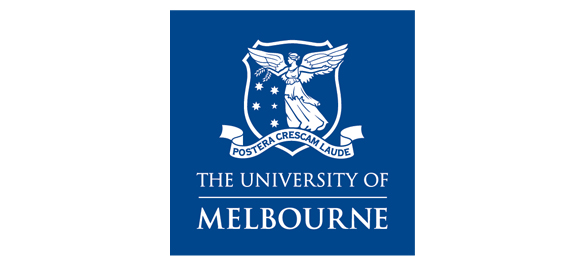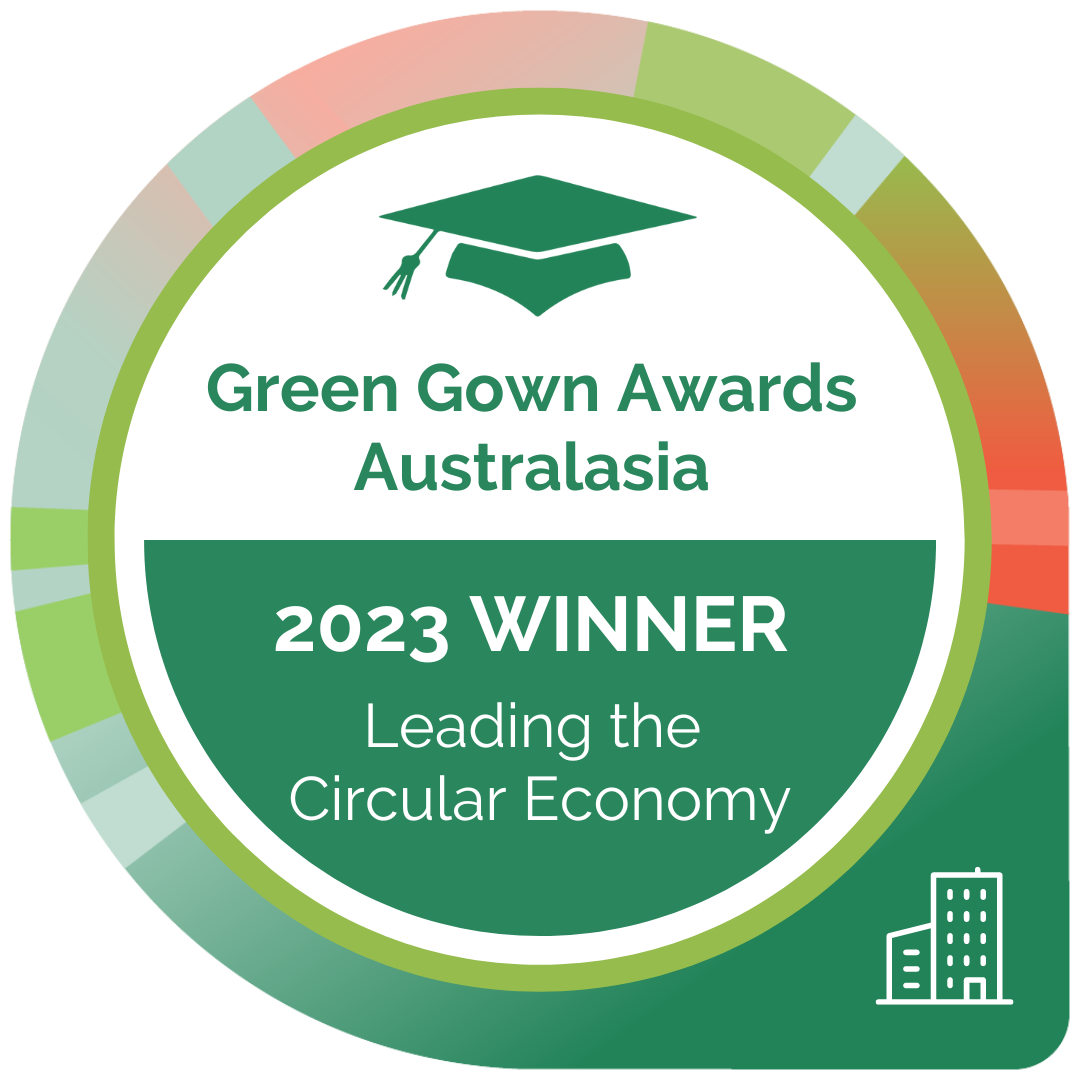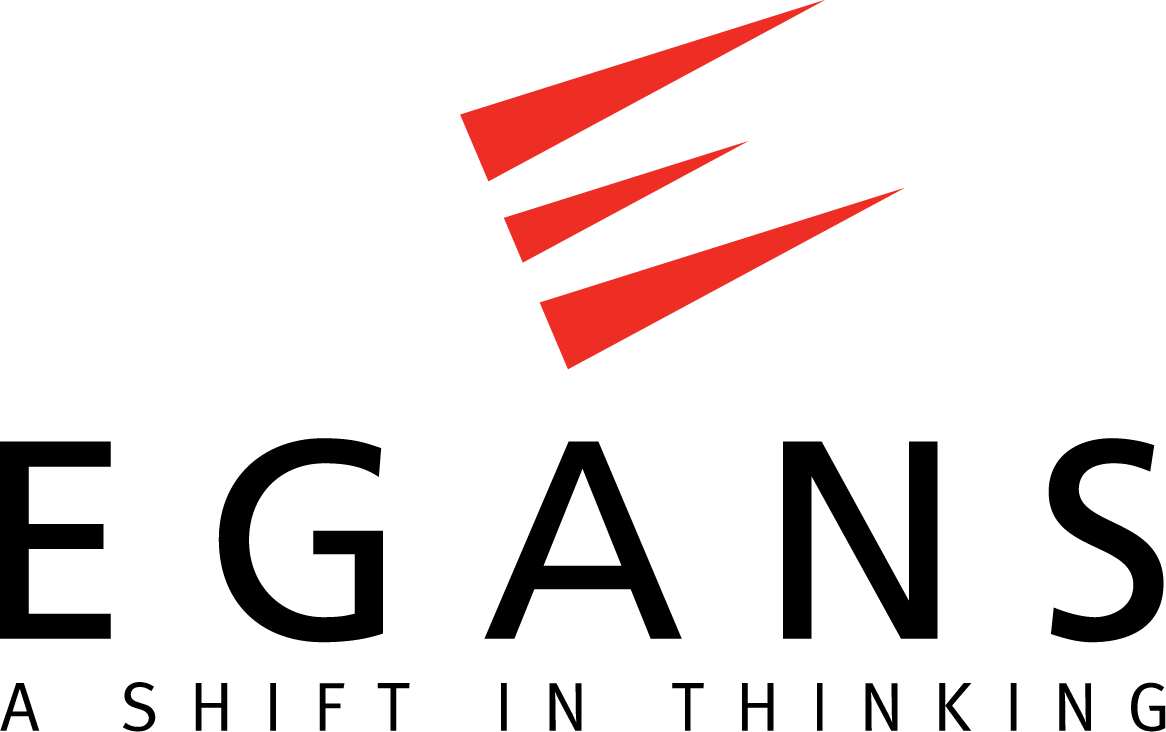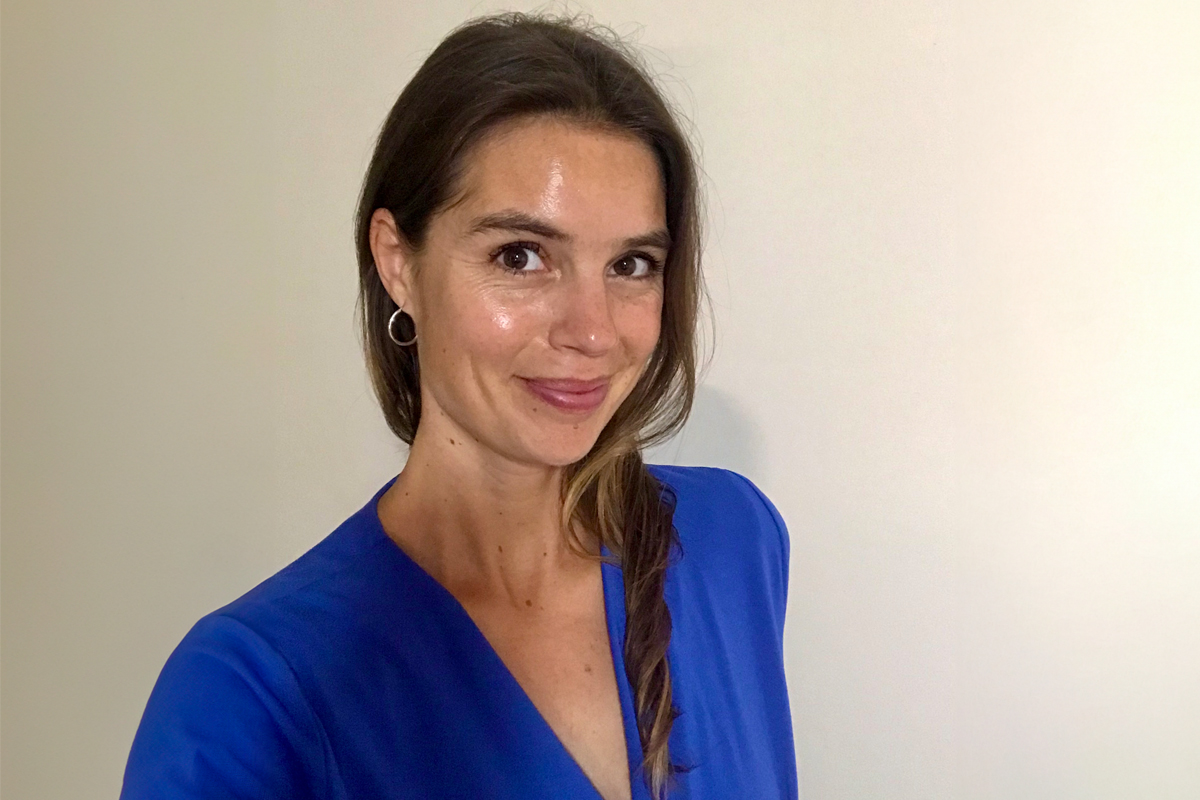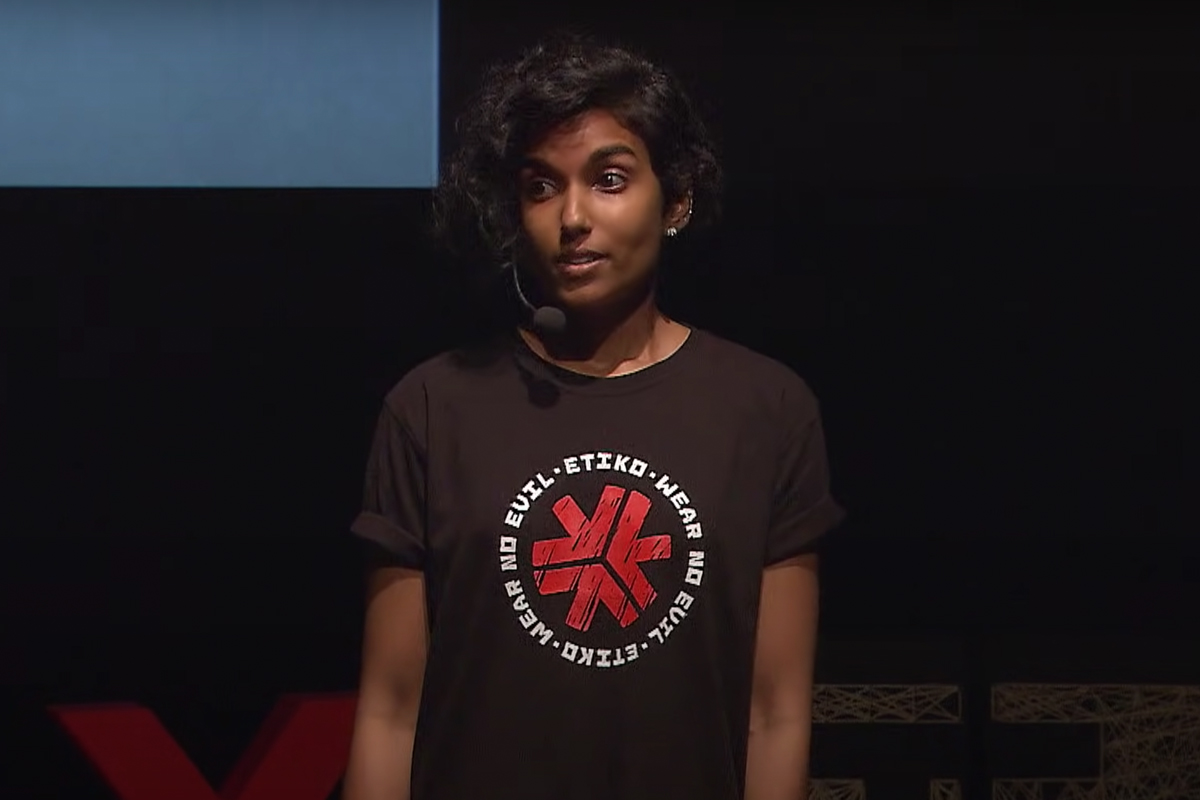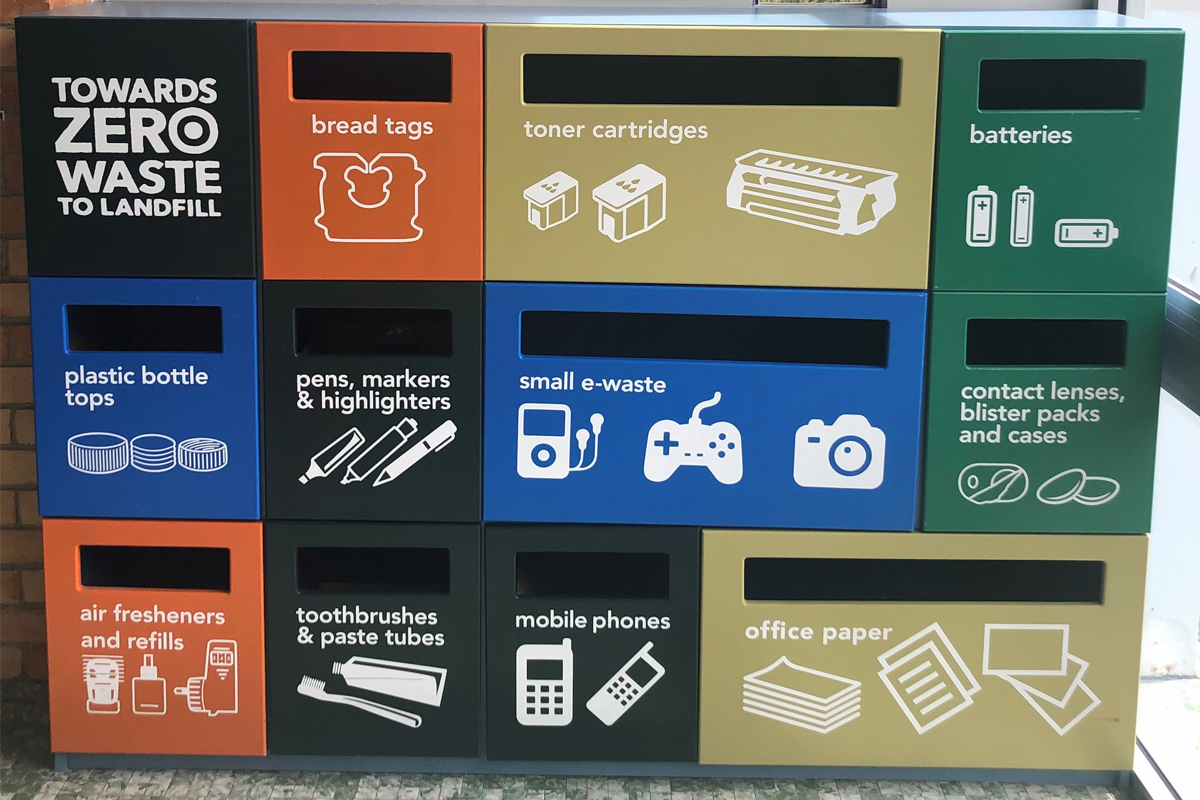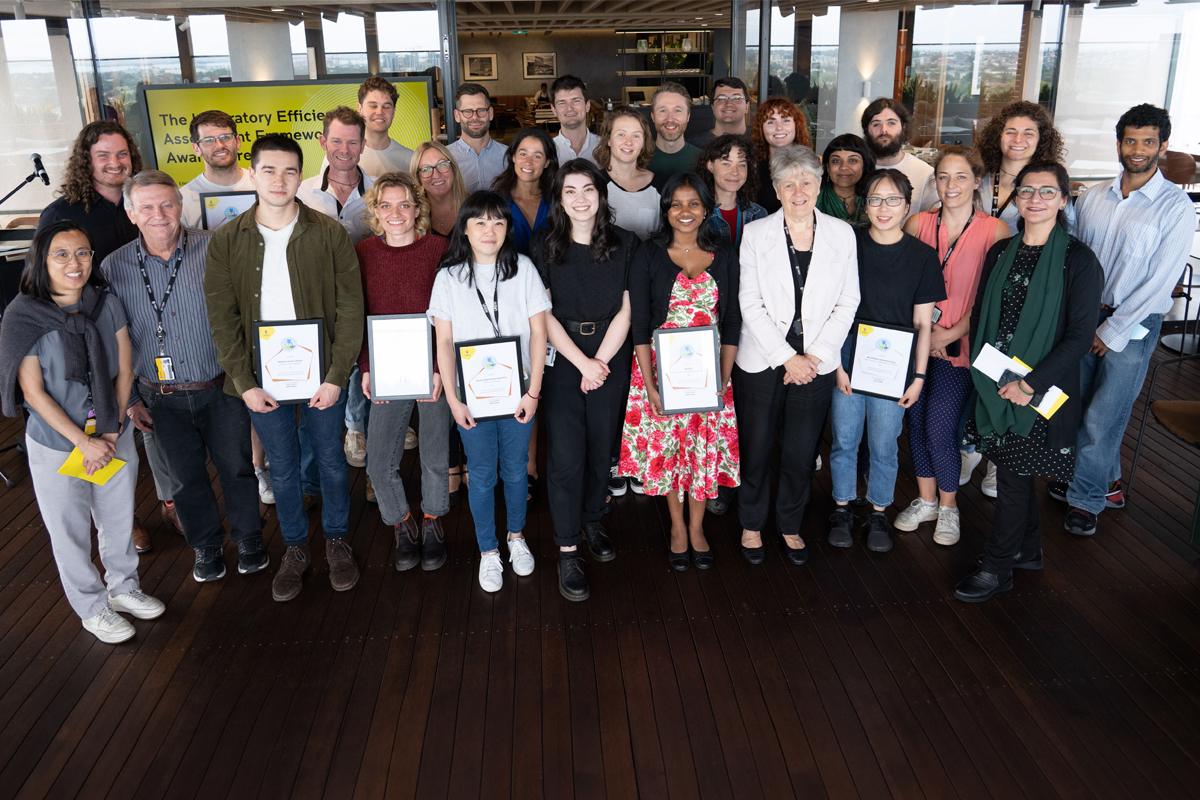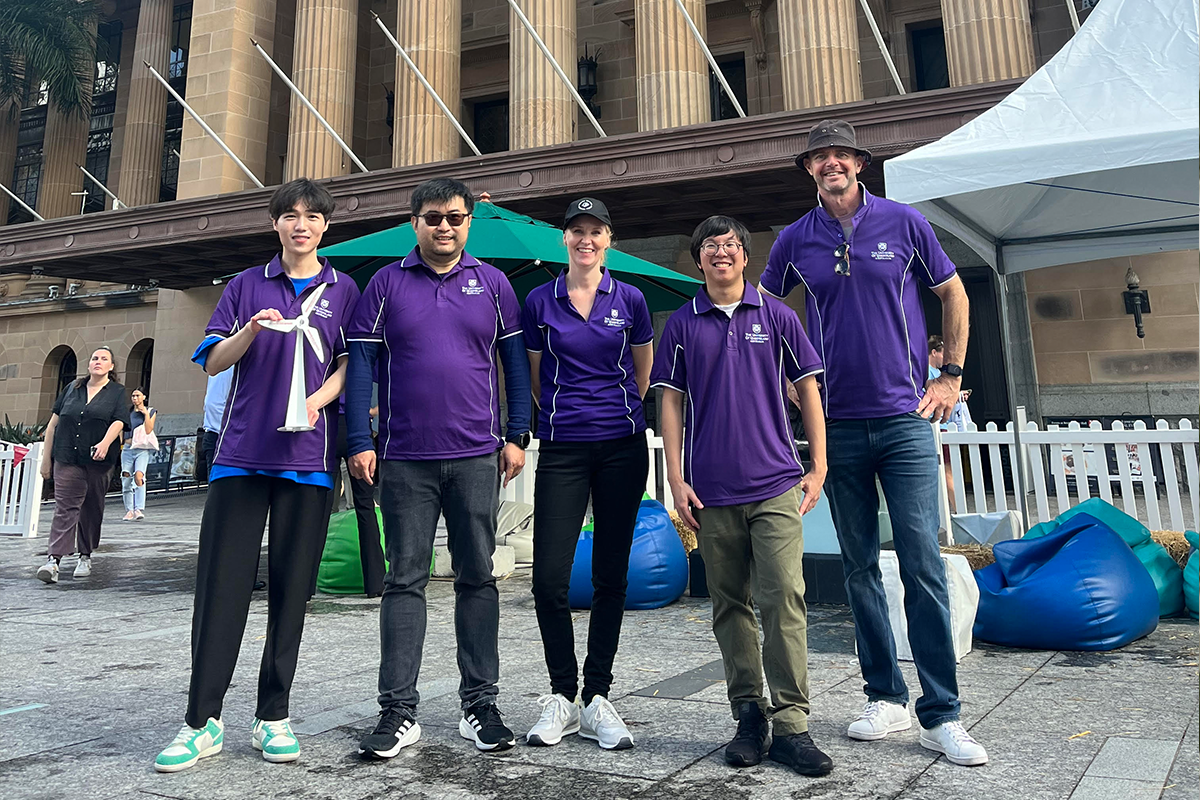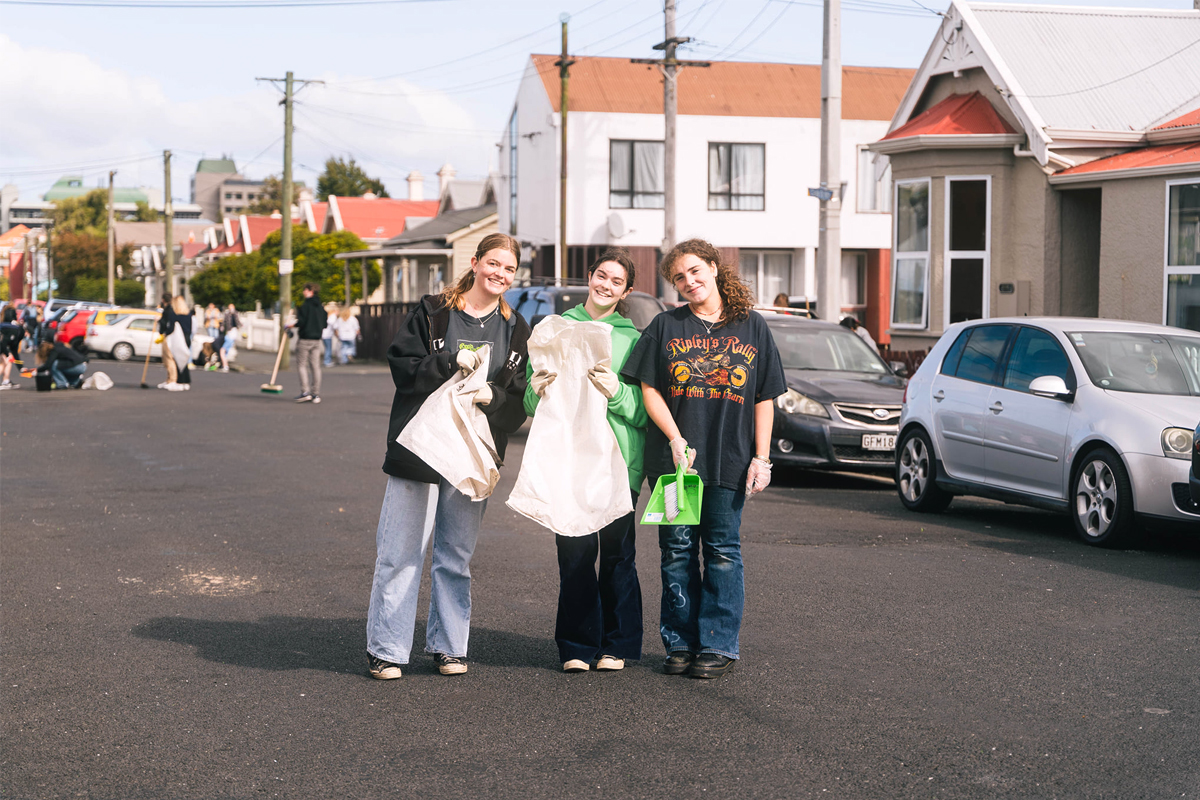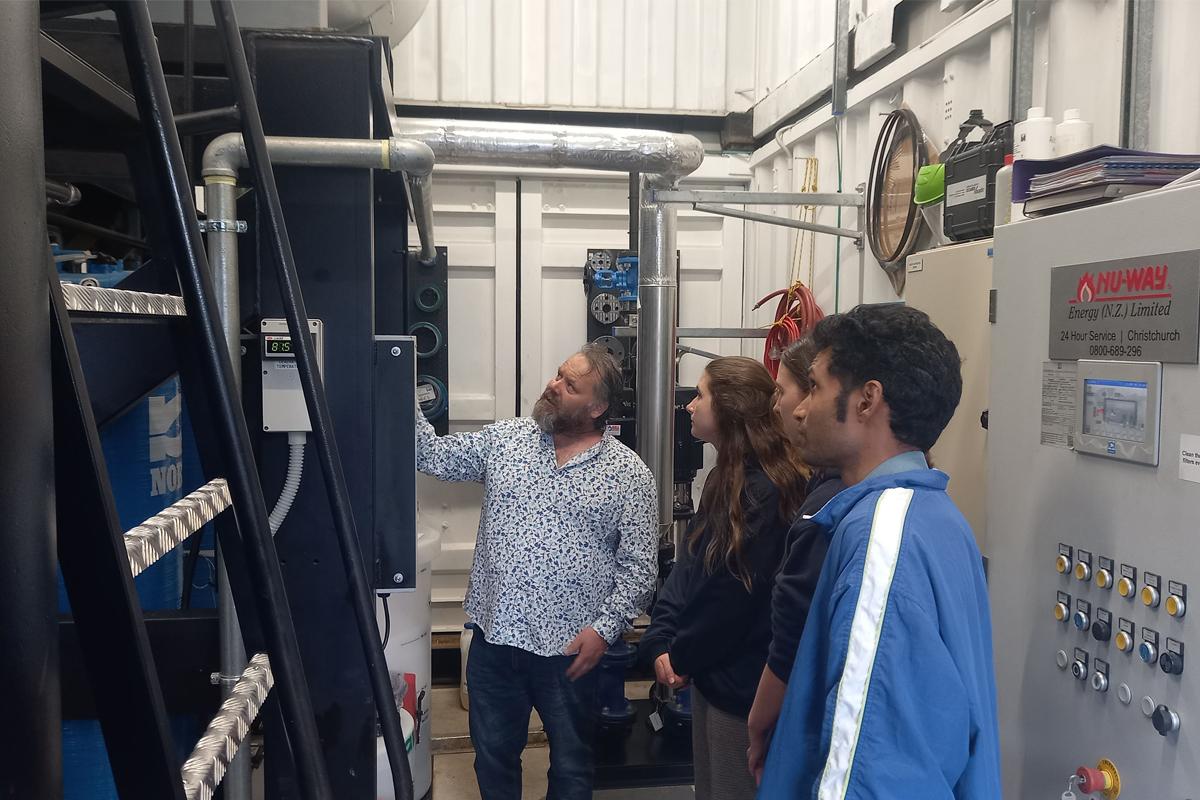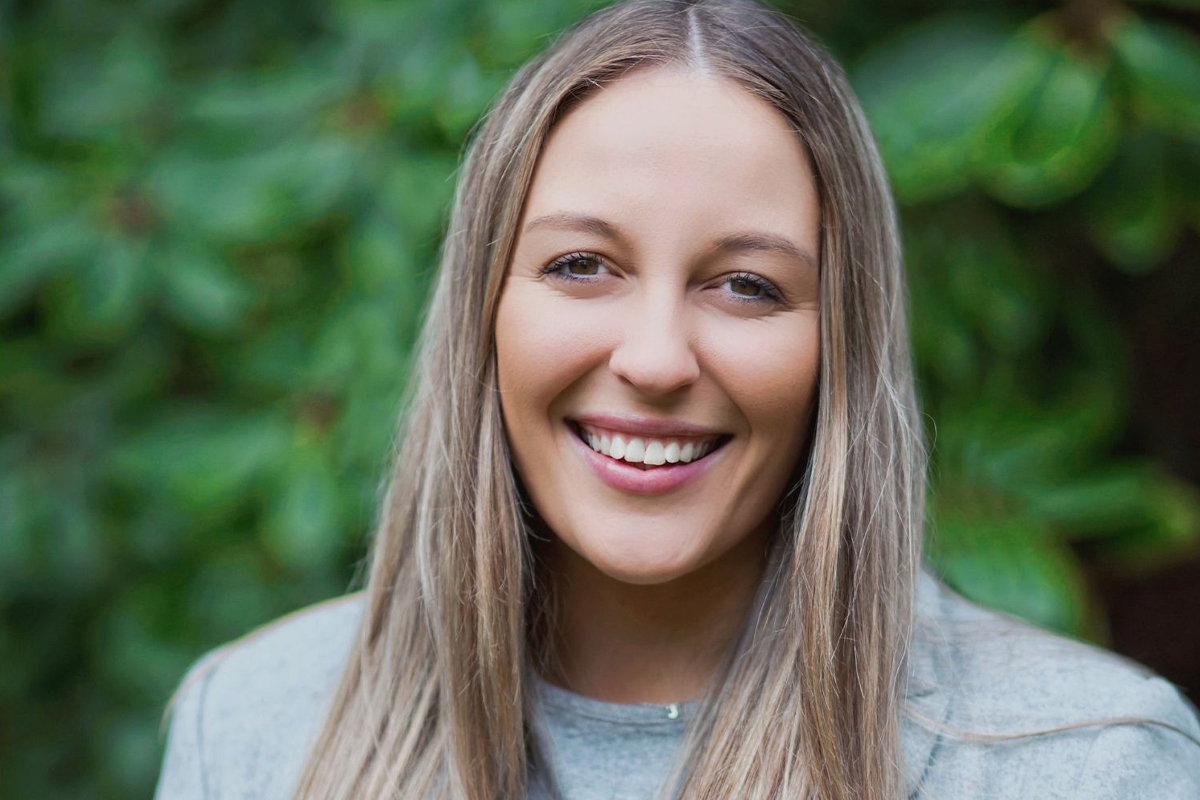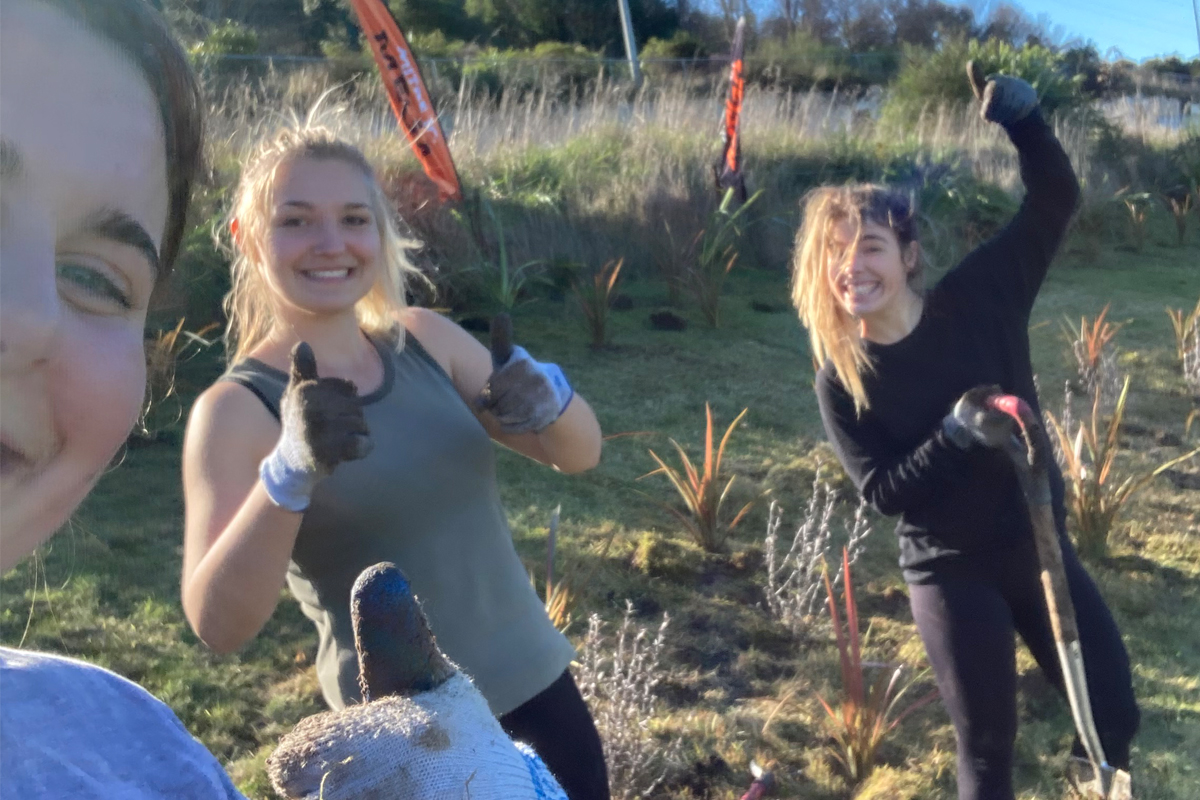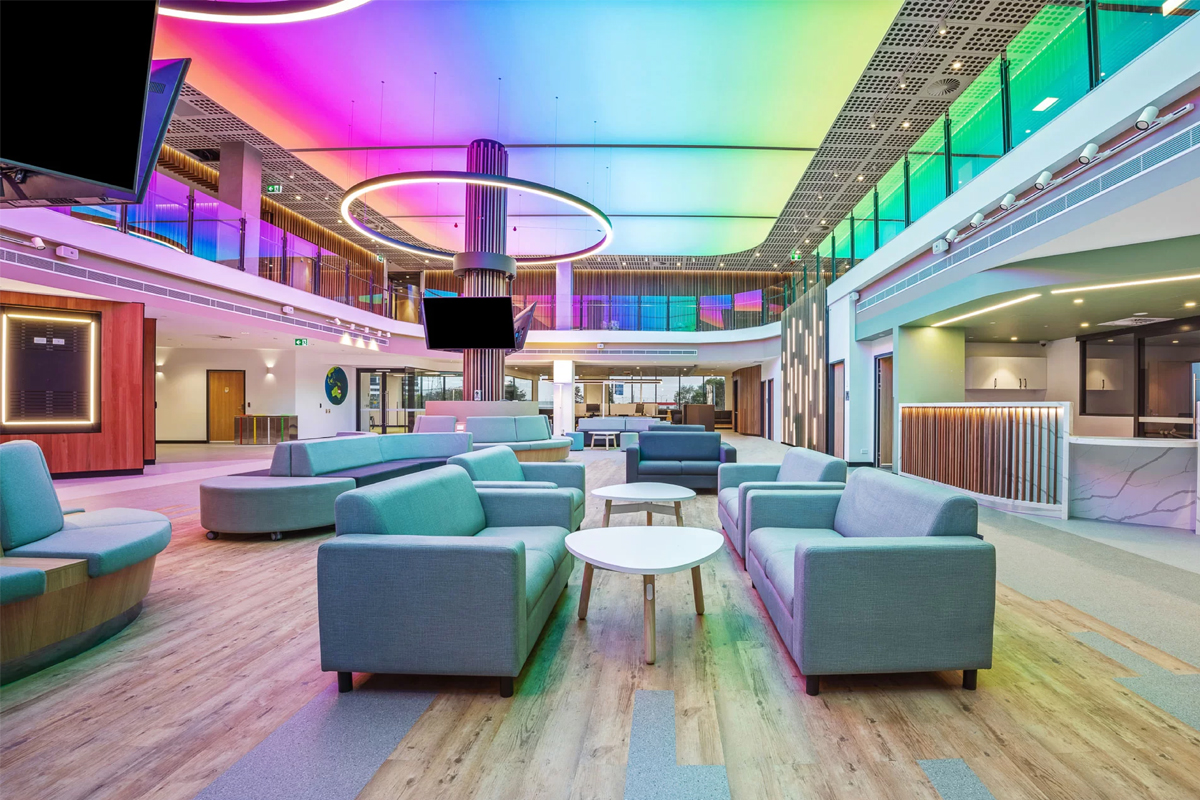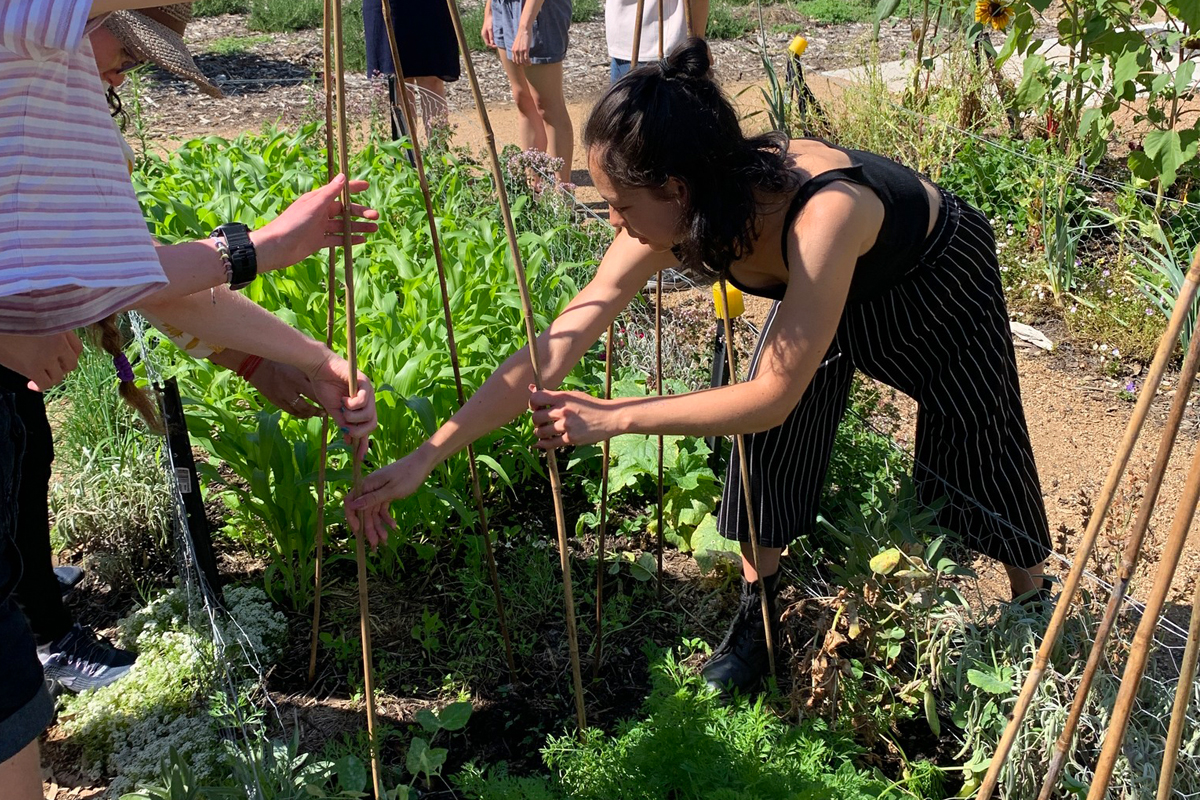Leading the Circular Economy/Winners category
The University of Melbourne’s circular economy journey began in 2012 with the launch of the award-winning Furniture and Equipment Reuse Service, providing second-hand office items to the University community. In 2019 the University piloted a substantial upgrade for its retail community, launching the Choose to Reuse Plate Program and the Choose to Reuse Events Service. In 2020, it launched a new Reuse Vending Machine (selling reusable items) and Green Caffeen, a swap cup program.
During this time, the University updated retail contracts to include sustainability clauses (e.g. compulsory dishwashing, sustainable and ethical procurement) and with the opening of the Student Precinct (6 buildings) in 2022, the inclusion of Choose to Reuse was compulsory and with a dedicated waste hub, waste scales and a food waste processor, the University was able to provide reuse services in a way it never has before. All the initiatives implemented, and listed below, align with the University’s Sustainability Plan 2030, which includes dedicated waste and circularity targets.
Furniture and Equipment Reuse Service (FERS)
Launched in 2012, this service provides University faculties, departments and affiliate organisations with a cost effective and immediate solution to their furniture needs. A range of workstations, chairs, storage solutions, and other used items are rehomed, presenting a sustainable and economic alternative to purchasing new furniture or equipment for the office. The service can be used to reuse single pieces of furniture as well as project-sized amounts. The service has diverted over 26,600 items from landfill equating to 637,700kg.
Choose to Reuse Plate Program (C2R) – Union House
First launched as Wash Against Waste in 2013, by a group of dedicated students, the Choose to Reuse Plate Program was re-launched in 2019 for approx. 12 retailers. It was a free service which provided staff and students with reusable crockery and cutlery to enjoy their meal waste-free on the Parkville campus. It washed 485,390 items until its close in 2022 with the opening of the Student Precinct. As a pilot, we learnt so much, retrofitted a vacated tenancy into a Dish Wash Hub, bought crockery and cutlery, updated bin and process signage, ran an art competition to provide additional ‘waste’ signage, engaged with retailers, the community and the cleaning contractors. It was the first of its kind, esp. size and scale in any Australian tertiary education institution. It posed many challenges, but it was as a direct result of feedback from the University community to improve our waste management practices. We listened to them!
Choose to Reuse Plate Program (C2R) – Student Precinct
Building on the successful implementation of C2R at Union House, reuse features and services were designed into the Student Precinct buildings from the start. Design features included integrated dishwashing services in all tenancies, a central Dish Wash Hub for the Student Pavilion building, built in drop-off bin stations and a waste hub for weighing and greater waste separation. Contractual inclusions in all retail contracts meant compulsory use of C2R and dishwashing services, as well as a ‘standard’ to be adhered to for all single-use disposable items, which meant paper board only and no PLA, single-use plastics or alternative material products such as corn starch could be used. The contracts also included restriction of sale on single-use plastic disposable beverage bottles, meaning they are effectively banned, and drinks can only be sold in glass, aluminium and paper board. This has not been implemented at any other University campus in Australasia that we are aware of. Furthermore, outdoor pick-up stations have meant the ability to ‘take away’ on reusable items across the precinct and wider campus has been a huge success, albeit with its challenges. 7 retailers have opened so far (4 2022, 3 in 2023), with 96,700 items already being washed. The community is clearly interested in this program with 230 attendees tuning into a Choose to Reuse Master Class the University delivered in partnership with Sustainability Victoria in June 2022 to learn about how they can set up a similar program at their own university or institution. The Masterclass has been viewed an additional 267 times making it the most viewed webinar of the Reuse Series. Over $622,000 was awarded in funding to 16 businesses.
Choose to Reuse Events Service (C2R Events)
A child of the C2R program, the Events Service provides reusable crockery and cutlery for staff and students to use at their on-campus events. It has its own dedicated Dish Wash Hub in the Arts and Culture building to facilitate dishwashing for all events (separate from the one in Student Pavilion). During the transition from Union House to Student Precinct, the University organised daily food trucks on site for approx. 9 months and they all used the C2R events services, with a significant decrease in waste generated. The service has been used more than 50 times diverting 18,888 items from landfill and showcasing to 5000 members of our community what a sustainable event looks like.
Green Caffeen
In 2021, the University partnered with Green Caffeen, a free (for users) reusable swap cup program which encourages staff and students to ditch disposables and enjoy their hot drink in a reusable cup. The University reviewed 6 providers for its swap credentials implementing Green Caffeen at 13 cafes with an additional 5 joining the network this year. Almost 1000 students and staff members have swapped 3800 cups. The University also partners with keep cup and sells keep cups and reusable water bottles at cost price to the University community which it has been doing since 2015 and has sold approx. 10,000 cups to date.
Reuse Vending Machine (RVM)
In an effort to promote reuse further and provide the necessary infrastructure to support the removal of plastic beverage bottles, in 2021 the University launched its first vending machine dedicated to reuse, supplying items such as keep cups, water bottles, cutlery packs, straws and period underwear at a low cost, with over 250 items sold to date. Reuse items are also soon to be sold in all vending machines across the Parkville campus. The vending machine contract was also updated to exclude all single-use disposable plastic bottles from being sold in machines on campus, essentially providing a transition to a single-use disposable bottle free campus.
New Student Precinct
The Student Precinct is now the home of the new Choose to Reuse program. This is integrated and holistic across the precinct. There are challenges, but so far all retailers have abided by the sustainability clauses in their leasing agreements, which aligns with the University’s sustainability targets. Where C2R data is collected for 8 retailers, there are 16 retailers in total offering reuse and abiding by the sustainability clauses. There is also a dedicated Waste Hub, with scales weighing all the retail waste, this allows us to work directly with the retailer on an individual basis to reduce their waste and not an assumed set of principles. We are the first institution, as far as we know, to implement scales from Foresight Environmental to weigh waste. Organic retailer waste is also processed onsite in the Waste Hub via a food waste processor and the front of house organics bins are taken away and composted by our waste service provider.
The Choose to reuse program has been a catalyst for many other operational changes across the University, raising the profile of reuse across many areas. Concurrently, since 2018, the University has implemented an e-reuse scheme across its IT fleet with ‘reuse’ computers available across the University. 1,645 computers have been kept in reuse so far with a replacement value of over $2,500,000. It also has two ‘maker spaces’ within its faculties; 1. in Melbourne Connect, Faculty of Engineering and 2. In the Glyn Davis building, Faculty of Design and Architecture, that uses waste materials from other parts of the University in its experimental learning spaces. The University is also mid-way through a sustainability review of the University’s COS (products catalogue) to remove less sustainable options, including disposable cutlery etc that now have reusable options. Future plans include a bike swap pilot with Brain Waves bikes to launch in semester 2 2023 for the sale of disused and abandoned bikes.
The University is also now seeking to establish a baseline metric of circularity with the Ellen McArthur Circulytics program from 2023. This baseline will allow the University to work with greater scope and purpose to widen the scope of reuse and start to embed circularity further across the University. Each of our initiatives focuses on keeping items in their original state for as long as possible and out of landfill, moving from a liner to a circular economy.
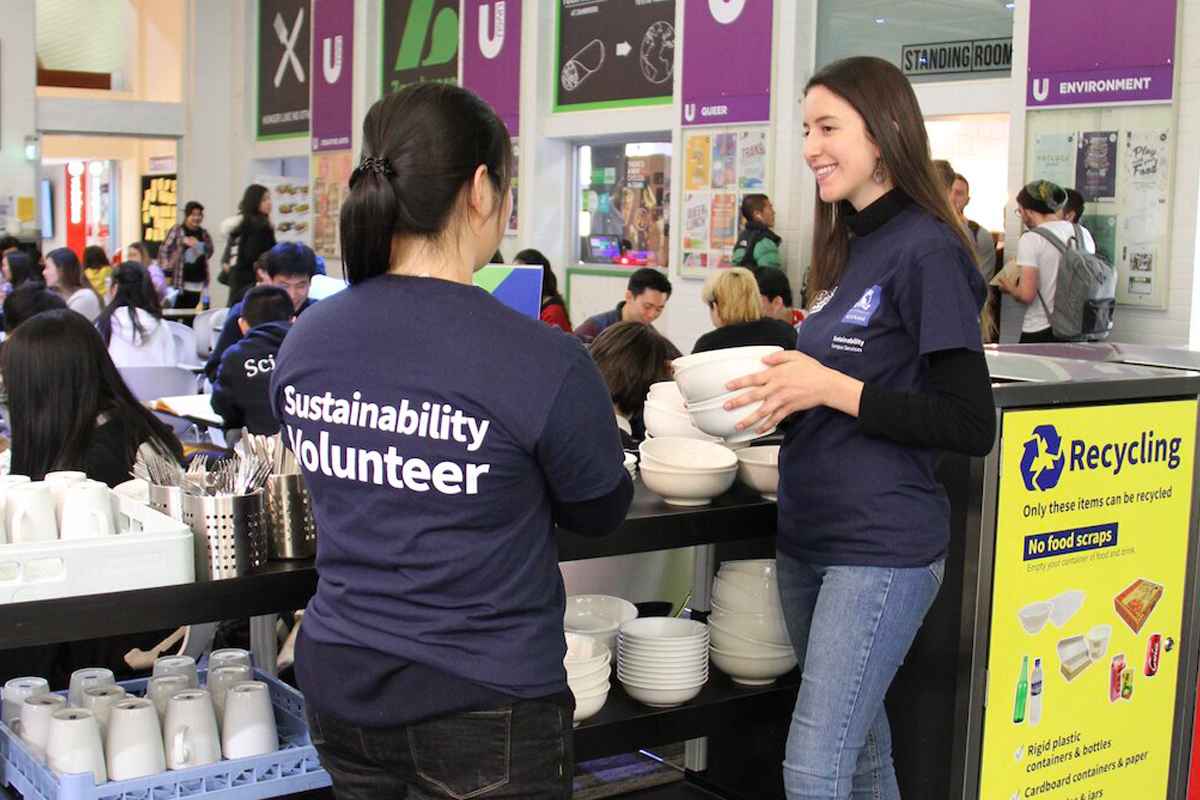
Environmental and social benefits
The University’s circular economy initiatives have provided numerous benefits to not only reduce waste to landfill, but also positively impacting the whole university community.
To date, FERS has diverted over 26,600 items from landfill equating to 637,700kg. Since its successful pilot and the new program in the Student Precinct, C2R has diverted over 580,000 items from landfill. Both hugely successful programs not only reduce waste to landfill, they are also forward-facing initiatives that directly engage with the community. The C2R Events Service also provides a visible social and environmental benefit to the community allowing for reuse to be easily integrated into events, which pre-covid there were approx. 4,000 events held on campus annually. This service is only increasing in popularity and has already diverted over 18,800 items from landfill whilst allowing event organisers to have an easy win for sustainable events.
These programs are designed to bring reuse to the forefront in an easy and accessible way and provide a ‘living lab’ opportunity to reduce waste on campus. The same can be said for the Green Caffeen swap cup program which has kept 3800 disposable cups from landfill and engaged with over 1000 staff and students, providing a better way for people to enjoy their hot drinks. Furthermore, purchasing sustainable items has never been easier with the RVM. This initiative has put affordable reusable bottles, Keep Cups, face masks and more in the hands of almost 300 students and has led the way for reusables to be included in all vending machines on campus.
Food waste is a major problem and significant GHG emitter when it ends up in landfill. That is why the University collects food waste through the Choose to Reuse Plate Program and Events Service. Organic waste is also collected throughout the entire Student Precinct on the Parkville campus and all back of house retail waste is collected in the precinct and processed onsite via a Food Waste Processor. We aren’t stopping there, with campus wide collection at the Southbank and Dookie campuses set to start this year. These changes will make drastic reduction in our waste to landfill.
Where many of our programs rely on the engagement/participation of our community, the University has also committed to applying systemic changes with operational and environmental benefits, including:
- Development of a Single-Use Disposable Item Standard which all new vendors much abide by.
- Restricting all single-use plastic disposal takeaway beverage bottles in vending machines and new food and beverage tenancies. This is outside the scope of the Victorian Government single use plastics ban and enforcing those in scope, but having provided a reuse alternative ahead of the ban.
- Having legal requirements for food and beverage to offer reusables, as part of their sustainability clauses within their contracts.
These changes have led the way for other Universities in the sector, to leverage off the University of Melbourne’s journey and experiences. UoM was approached by Sustainability Victoria in 2021 to run a reuse master class for the sector. It was well attended with over 230 attendees. As a result, SV released a funding package for other interested parties to implement similar choose to reuse initiatives. Over $622,000 was awarded in funding to 16 businesses and using UoM’s best practice case study, initiatives have been set up at Deakin, Monash and La Trobe universities.
Leadership and engagement
For the success of our programs, communication and engagement with our community is essential. The C2R, C2R Events, FERS and Green Caffeen programs are not only implemented to improve how the University operates, they also provide education about reducing material use, reusing, repurposing, and recycling which has been critical in the program success. Having diverted over 600,000 items from landfill collectively, these programs have also influenced staff and students and retailers to rethink their consumption choices on a personal level. They have also provided the necessary infrastructure to make change ‘easy’. They have provided an opportunity for further collaboration between groups, for example FERS has allowed for communication between office relocations and the minor works teams, to reuse items which would have otherwise gone to landfill and C2R has allowed the Sustainability Team to connect with retailers, external retail relationship managers and cleaners on a level they have never been able to before.
In the Student Precinct Waste Hub granular data is collected with the waste scales which enables us to directly engage with retailers. From analysing this data, we have been able to determine which retailers need more bins, signage and training and provided this accordingly. Providing both engagement and leadership opportunities to improve processes. Similarly, the Sustainability Team has a direct relationship with the cleaners in the Student Precinct and after determining contamination was not being recorded correctly, has developed training materials to deliver to cleaners across campus.
Significance to the sector
Given the interest in replicating the C2R program from other universities, local government and councils, it is clear that this is an ‘innovative’ (based on today’s practices) and much need solution to many waste management issues. Even though reuse is far from innovative if you revert back to practices from only 20-30 years ago, meaning the solutions are easily and readily available. The clauses in the sustainability leasing for retailers are all common practices that are just out of fashion. Many institutions recognise the need to change and are working towards a circular economy, with UoM leading the way with its C2R program and associated contractual changes. The Waste Hub in the Student Precinct provides up to date, granular information on waste streams from 20 retail tenancies, allowing the Sustainability Team to have dedicated engagement plans to reduce waste. What is also distinctive about this proposal is that the University is also implementing initiatives in more niche areas, such as C2R Events. Although these initiatives may not seem to have the biggest impact, they are low maintenance and low cost, but drive widespread behaviour change on campus, due to the prolific nature of running events, embedding sustainability in all areas and across all disciplinary areas.
This shift from a linear economy to a circular economy has a profound impact across all parts of the supply change from reducing consumption in the first place, to reducing virgin materials during operation and finally reducing waste materials at end of life. By showcasing simple, yet wider spread reuse initiatives on campus this is demonstrating to other organisations and institutions that there are alternative options.
Wider societal impact
The University is demonstrating true leadership in this area. No other university at the time of the C2R pilot had reuse initiatives on this scale, or size. The University is demonstrating a new approach to supporting a transition to a circular economy from an operational perspective. The University aims to guide others in this sector, but also influence its tens of thousands of students. Our mission is to educate and engage with our community and provide a world class campus experience. By providing the infrastructure to support students in adopting a more sustainable lifestyle we hope they will mirror this behaviour off campus. This will expand the benefits of these initiatives outside the campus and into the community.
For retailers, many of which have multiple stores, abiding by their contractual agreements and working to improve sustainability at the Parkville campus stores will show them how simple and impactful the changes they make are, not only environmental but economical. This could lead to changes in multiple franchise stores.
All of these initiatives can be trialled and upscaled or replicated if successful, as seen at the University. Beginning with FERS in 2012, our reuse programs have continued to expand creating an immensely positive impact to campus life, community knowledge and providing transferable processes for other organisations to follow. These programs have the ability to influence a community of change-makers and also have several environmental benefits including mitigating climate change and conserving natural resources.
Learner/Graduate employer impact
The programs offered on campus require the input and engagement of students. The more sustainability initiatives students encounter on campus, the more likely they will take the skills and knowledge with them to their next opportunity (whether it be at another university or a workplace).
Volunteers and interns are also essential in assisting with the promotion of sustainability initiatives on campus. This partnership between volunteers and interns and the University is mutualistic because it provides students with a chance to improve key employability skills such as communication, engagement and teamwork. Furthermore, internship opportunities provide students with a chance to get a feel for being in the workforce and how a career in the circular economy sector may look.
Through these initiatives, the University hopes to educate students on how to learn and work with sustainability in mind regardless of if their course focuses on sustainability. They demonstrate real life solutions to common, global problems and allows every person to take part and make personal positive change.
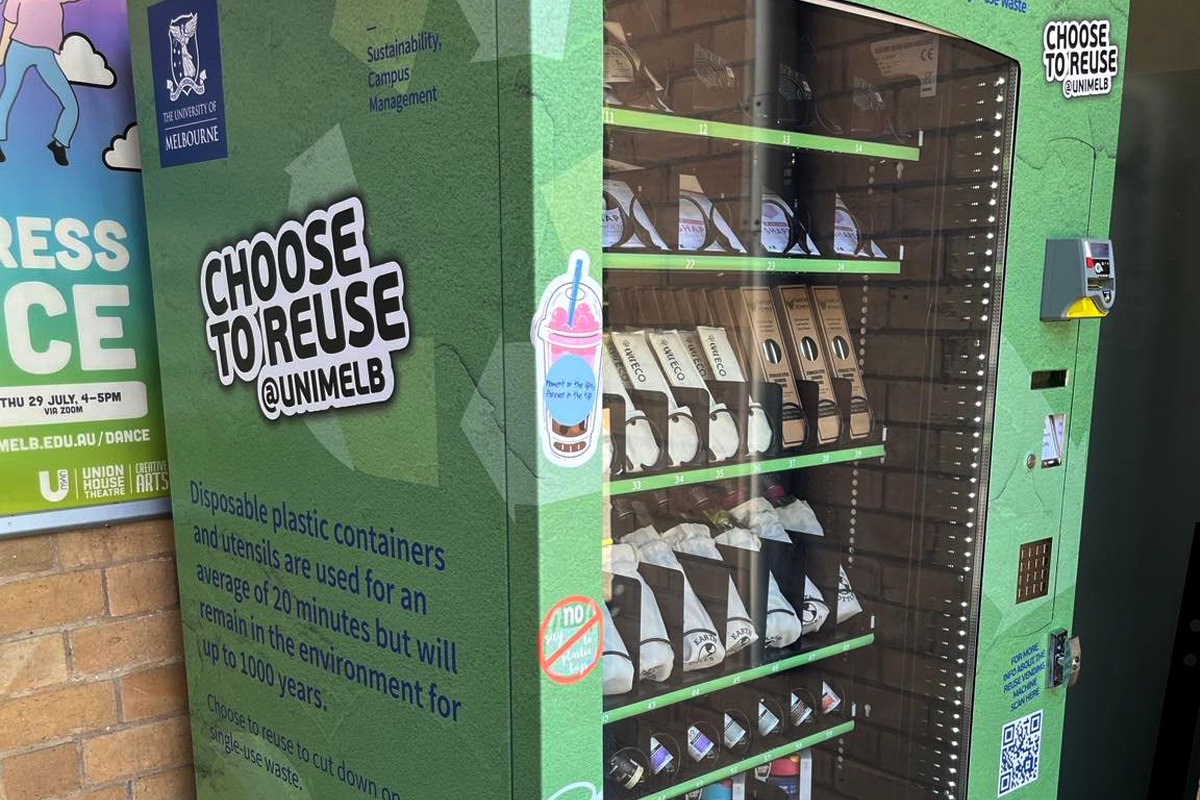
Top 3 learnings
Category finalists
Climate Action/Winners
Climate Action/Winners
Benefitting Society/Winners
Benefitting Society/Winners
Sustainability Champion – Student/Winners
Sustainability Champion – Student/Winners
Creating Impact/Winners
Creating Impact/Winners
Sustainability Champion – Student/Winners
Sustainability Champion – Student/Winners
Leading the Circular Economy/Winners
Leading the Circular Economy/Winners
Creating Impact/Winners
Creating Impact/Winners
Creating Impact/Winners
Creating Impact/Winners
Diversity, Equity & Inclusion in Sustainability/Winners
Diversity, Equity & Inclusion in Sustainability/Winners
Next Generation Learning & Skills/Winners
Next Generation Learning & Skills/Winners
Sustainability Institution of the Year/Winners
Sustainability Institution of the Year/Winners
Leading the Circular Economy
Leading the Circular Economy
Next Generation Learning & Skills/Winners
Next Generation Learning & Skills/Winners
Sustainability Champion – Staff/Winners
Sustainability Champion – Staff/Winners
Sustainability Champion – Student/Winners
Sustainability Champion – Student/Winners
Next Generation Learning & Skills/Winners
Next Generation Learning & Skills/Winners
Sustainability Champion – Staff/Winners
Sustainability Champion – Staff/Winners
Sustainability Champion – Staff/Winners
Sustainability Champion – Staff/Winners
Student Engagement/Winners
Student Engagement/Winners
Past winners
Benefitting Society/Winners
Benefitting Society/Winners
Diversity, Equity & Inclusion in Sustainability/Winners
Diversity, Equity & Inclusion in Sustainability/Winners
Climate Action/Winners
Climate Action/Winners
Sustainability Institution of the Year/Winners
Sustainability Institution of the Year/Winners
Creating Impact/Winners
Creating Impact/Winners
Creating Impact/Winners
Creating Impact/Winners
Top 3 learnings
Leading the Circular Economy/Winners category
The University of Melbourne’s circular economy journey began in 2012 with the launch of the award-winning Furniture and Equipment Reuse Service, providing second-hand office items to the University community. In 2019 the University piloted a substantial upgrade for its retail community, launching the Choose to Reuse Plate Program and the Choose to Reuse Events Service. In 2020, it launched a new Reuse Vending Machine (selling reusable items) and Green Caffeen, a swap cup program.
During this time, the University updated retail contracts to include sustainability clauses (e.g. compulsory dishwashing, sustainable and ethical procurement) and with the opening of the Student Precinct (6 buildings) in 2022, the inclusion of Choose to Reuse was compulsory and with a dedicated waste hub, waste scales and a food waste processor, the University was able to provide reuse services in a way it never has before. All the initiatives implemented, and listed below, align with the University’s Sustainability Plan 2030, which includes dedicated waste and circularity targets.
Furniture and Equipment Reuse Service (FERS)
Launched in 2012, this service provides University faculties, departments and affiliate organisations with a cost effective and immediate solution to their furniture needs. A range of workstations, chairs, storage solutions, and other used items are rehomed, presenting a sustainable and economic alternative to purchasing new furniture or equipment for the office. The service can be used to reuse single pieces of furniture as well as project-sized amounts. The service has diverted over 26,600 items from landfill equating to 637,700kg.
Choose to Reuse Plate Program (C2R) – Union House
First launched as Wash Against Waste in 2013, by a group of dedicated students, the Choose to Reuse Plate Program was re-launched in 2019 for approx. 12 retailers. It was a free service which provided staff and students with reusable crockery and cutlery to enjoy their meal waste-free on the Parkville campus. It washed 485,390 items until its close in 2022 with the opening of the Student Precinct. As a pilot, we learnt so much, retrofitted a vacated tenancy into a Dish Wash Hub, bought crockery and cutlery, updated bin and process signage, ran an art competition to provide additional ‘waste’ signage, engaged with retailers, the community and the cleaning contractors. It was the first of its kind, esp. size and scale in any Australian tertiary education institution. It posed many challenges, but it was as a direct result of feedback from the University community to improve our waste management practices. We listened to them!
Choose to Reuse Plate Program (C2R) – Student Precinct
Building on the successful implementation of C2R at Union House, reuse features and services were designed into the Student Precinct buildings from the start. Design features included integrated dishwashing services in all tenancies, a central Dish Wash Hub for the Student Pavilion building, built in drop-off bin stations and a waste hub for weighing and greater waste separation. Contractual inclusions in all retail contracts meant compulsory use of C2R and dishwashing services, as well as a ‘standard’ to be adhered to for all single-use disposable items, which meant paper board only and no PLA, single-use plastics or alternative material products such as corn starch could be used. The contracts also included restriction of sale on single-use plastic disposable beverage bottles, meaning they are effectively banned, and drinks can only be sold in glass, aluminium and paper board. This has not been implemented at any other University campus in Australasia that we are aware of. Furthermore, outdoor pick-up stations have meant the ability to ‘take away’ on reusable items across the precinct and wider campus has been a huge success, albeit with its challenges. 7 retailers have opened so far (4 2022, 3 in 2023), with 96,700 items already being washed. The community is clearly interested in this program with 230 attendees tuning into a Choose to Reuse Master Class the University delivered in partnership with Sustainability Victoria in June 2022 to learn about how they can set up a similar program at their own university or institution. The Masterclass has been viewed an additional 267 times making it the most viewed webinar of the Reuse Series. Over $622,000 was awarded in funding to 16 businesses.
Choose to Reuse Events Service (C2R Events)
A child of the C2R program, the Events Service provides reusable crockery and cutlery for staff and students to use at their on-campus events. It has its own dedicated Dish Wash Hub in the Arts and Culture building to facilitate dishwashing for all events (separate from the one in Student Pavilion). During the transition from Union House to Student Precinct, the University organised daily food trucks on site for approx. 9 months and they all used the C2R events services, with a significant decrease in waste generated. The service has been used more than 50 times diverting 18,888 items from landfill and showcasing to 5000 members of our community what a sustainable event looks like.
Green Caffeen
In 2021, the University partnered with Green Caffeen, a free (for users) reusable swap cup program which encourages staff and students to ditch disposables and enjoy their hot drink in a reusable cup. The University reviewed 6 providers for its swap credentials implementing Green Caffeen at 13 cafes with an additional 5 joining the network this year. Almost 1000 students and staff members have swapped 3800 cups. The University also partners with keep cup and sells keep cups and reusable water bottles at cost price to the University community which it has been doing since 2015 and has sold approx. 10,000 cups to date.
Reuse Vending Machine (RVM)
In an effort to promote reuse further and provide the necessary infrastructure to support the removal of plastic beverage bottles, in 2021 the University launched its first vending machine dedicated to reuse, supplying items such as keep cups, water bottles, cutlery packs, straws and period underwear at a low cost, with over 250 items sold to date. Reuse items are also soon to be sold in all vending machines across the Parkville campus. The vending machine contract was also updated to exclude all single-use disposable plastic bottles from being sold in machines on campus, essentially providing a transition to a single-use disposable bottle free campus.
New Student Precinct
The Student Precinct is now the home of the new Choose to Reuse program. This is integrated and holistic across the precinct. There are challenges, but so far all retailers have abided by the sustainability clauses in their leasing agreements, which aligns with the University’s sustainability targets. Where C2R data is collected for 8 retailers, there are 16 retailers in total offering reuse and abiding by the sustainability clauses. There is also a dedicated Waste Hub, with scales weighing all the retail waste, this allows us to work directly with the retailer on an individual basis to reduce their waste and not an assumed set of principles. We are the first institution, as far as we know, to implement scales from Foresight Environmental to weigh waste. Organic retailer waste is also processed onsite in the Waste Hub via a food waste processor and the front of house organics bins are taken away and composted by our waste service provider.
The Choose to reuse program has been a catalyst for many other operational changes across the University, raising the profile of reuse across many areas. Concurrently, since 2018, the University has implemented an e-reuse scheme across its IT fleet with ‘reuse’ computers available across the University. 1,645 computers have been kept in reuse so far with a replacement value of over $2,500,000. It also has two ‘maker spaces’ within its faculties; 1. in Melbourne Connect, Faculty of Engineering and 2. In the Glyn Davis building, Faculty of Design and Architecture, that uses waste materials from other parts of the University in its experimental learning spaces. The University is also mid-way through a sustainability review of the University’s COS (products catalogue) to remove less sustainable options, including disposable cutlery etc that now have reusable options. Future plans include a bike swap pilot with Brain Waves bikes to launch in semester 2 2023 for the sale of disused and abandoned bikes.
The University is also now seeking to establish a baseline metric of circularity with the Ellen McArthur Circulytics program from 2023. This baseline will allow the University to work with greater scope and purpose to widen the scope of reuse and start to embed circularity further across the University. Each of our initiatives focuses on keeping items in their original state for as long as possible and out of landfill, moving from a liner to a circular economy.

Environmental and social benefits
The University’s circular economy initiatives have provided numerous benefits to not only reduce waste to landfill, but also positively impacting the whole university community.
To date, FERS has diverted over 26,600 items from landfill equating to 637,700kg. Since its successful pilot and the new program in the Student Precinct, C2R has diverted over 580,000 items from landfill. Both hugely successful programs not only reduce waste to landfill, they are also forward-facing initiatives that directly engage with the community. The C2R Events Service also provides a visible social and environmental benefit to the community allowing for reuse to be easily integrated into events, which pre-covid there were approx. 4,000 events held on campus annually. This service is only increasing in popularity and has already diverted over 18,800 items from landfill whilst allowing event organisers to have an easy win for sustainable events.
These programs are designed to bring reuse to the forefront in an easy and accessible way and provide a ‘living lab’ opportunity to reduce waste on campus. The same can be said for the Green Caffeen swap cup program which has kept 3800 disposable cups from landfill and engaged with over 1000 staff and students, providing a better way for people to enjoy their hot drinks. Furthermore, purchasing sustainable items has never been easier with the RVM. This initiative has put affordable reusable bottles, Keep Cups, face masks and more in the hands of almost 300 students and has led the way for reusables to be included in all vending machines on campus.
Food waste is a major problem and significant GHG emitter when it ends up in landfill. That is why the University collects food waste through the Choose to Reuse Plate Program and Events Service. Organic waste is also collected throughout the entire Student Precinct on the Parkville campus and all back of house retail waste is collected in the precinct and processed onsite via a Food Waste Processor. We aren’t stopping there, with campus wide collection at the Southbank and Dookie campuses set to start this year. These changes will make drastic reduction in our waste to landfill.
Where many of our programs rely on the engagement/participation of our community, the University has also committed to applying systemic changes with operational and environmental benefits, including:
- Development of a Single-Use Disposable Item Standard which all new vendors much abide by.
- Restricting all single-use plastic disposal takeaway beverage bottles in vending machines and new food and beverage tenancies. This is outside the scope of the Victorian Government single use plastics ban and enforcing those in scope, but having provided a reuse alternative ahead of the ban.
- Having legal requirements for food and beverage to offer reusables, as part of their sustainability clauses within their contracts.
These changes have led the way for other Universities in the sector, to leverage off the University of Melbourne’s journey and experiences. UoM was approached by Sustainability Victoria in 2021 to run a reuse master class for the sector. It was well attended with over 230 attendees. As a result, SV released a funding package for other interested parties to implement similar choose to reuse initiatives. Over $622,000 was awarded in funding to 16 businesses and using UoM’s best practice case study, initiatives have been set up at Deakin, Monash and La Trobe universities.
Leadership and engagement
For the success of our programs, communication and engagement with our community is essential. The C2R, C2R Events, FERS and Green Caffeen programs are not only implemented to improve how the University operates, they also provide education about reducing material use, reusing, repurposing, and recycling which has been critical in the program success. Having diverted over 600,000 items from landfill collectively, these programs have also influenced staff and students and retailers to rethink their consumption choices on a personal level. They have also provided the necessary infrastructure to make change ‘easy’. They have provided an opportunity for further collaboration between groups, for example FERS has allowed for communication between office relocations and the minor works teams, to reuse items which would have otherwise gone to landfill and C2R has allowed the Sustainability Team to connect with retailers, external retail relationship managers and cleaners on a level they have never been able to before.
In the Student Precinct Waste Hub granular data is collected with the waste scales which enables us to directly engage with retailers. From analysing this data, we have been able to determine which retailers need more bins, signage and training and provided this accordingly. Providing both engagement and leadership opportunities to improve processes. Similarly, the Sustainability Team has a direct relationship with the cleaners in the Student Precinct and after determining contamination was not being recorded correctly, has developed training materials to deliver to cleaners across campus.
Significance to the sector
Given the interest in replicating the C2R program from other universities, local government and councils, it is clear that this is an ‘innovative’ (based on today’s practices) and much need solution to many waste management issues. Even though reuse is far from innovative if you revert back to practices from only 20-30 years ago, meaning the solutions are easily and readily available. The clauses in the sustainability leasing for retailers are all common practices that are just out of fashion. Many institutions recognise the need to change and are working towards a circular economy, with UoM leading the way with its C2R program and associated contractual changes. The Waste Hub in the Student Precinct provides up to date, granular information on waste streams from 20 retail tenancies, allowing the Sustainability Team to have dedicated engagement plans to reduce waste. What is also distinctive about this proposal is that the University is also implementing initiatives in more niche areas, such as C2R Events. Although these initiatives may not seem to have the biggest impact, they are low maintenance and low cost, but drive widespread behaviour change on campus, due to the prolific nature of running events, embedding sustainability in all areas and across all disciplinary areas.
This shift from a linear economy to a circular economy has a profound impact across all parts of the supply change from reducing consumption in the first place, to reducing virgin materials during operation and finally reducing waste materials at end of life. By showcasing simple, yet wider spread reuse initiatives on campus this is demonstrating to other organisations and institutions that there are alternative options.
Wider societal impact
The University is demonstrating true leadership in this area. No other university at the time of the C2R pilot had reuse initiatives on this scale, or size. The University is demonstrating a new approach to supporting a transition to a circular economy from an operational perspective. The University aims to guide others in this sector, but also influence its tens of thousands of students. Our mission is to educate and engage with our community and provide a world class campus experience. By providing the infrastructure to support students in adopting a more sustainable lifestyle we hope they will mirror this behaviour off campus. This will expand the benefits of these initiatives outside the campus and into the community.
For retailers, many of which have multiple stores, abiding by their contractual agreements and working to improve sustainability at the Parkville campus stores will show them how simple and impactful the changes they make are, not only environmental but economical. This could lead to changes in multiple franchise stores.
All of these initiatives can be trialled and upscaled or replicated if successful, as seen at the University. Beginning with FERS in 2012, our reuse programs have continued to expand creating an immensely positive impact to campus life, community knowledge and providing transferable processes for other organisations to follow. These programs have the ability to influence a community of change-makers and also have several environmental benefits including mitigating climate change and conserving natural resources.
Learner/Graduate employer impact
The programs offered on campus require the input and engagement of students. The more sustainability initiatives students encounter on campus, the more likely they will take the skills and knowledge with them to their next opportunity (whether it be at another university or a workplace).
Volunteers and interns are also essential in assisting with the promotion of sustainability initiatives on campus. This partnership between volunteers and interns and the University is mutualistic because it provides students with a chance to improve key employability skills such as communication, engagement and teamwork. Furthermore, internship opportunities provide students with a chance to get a feel for being in the workforce and how a career in the circular economy sector may look.
Through these initiatives, the University hopes to educate students on how to learn and work with sustainability in mind regardless of if their course focuses on sustainability. They demonstrate real life solutions to common, global problems and allows every person to take part and make personal positive change.

Related finalists
Climate Action/Winners
Climate Action/Winners
Benefitting Society/Winners
Benefitting Society/Winners
Sustainability Champion – Student/Winners
Sustainability Champion – Student/Winners
Creating Impact/Winners
Creating Impact/Winners
Sustainability Champion – Student/Winners
Sustainability Champion – Student/Winners
Leading the Circular Economy/Winners
Leading the Circular Economy/Winners
Creating Impact/Winners
Creating Impact/Winners
Creating Impact/Winners
Creating Impact/Winners
Diversity, Equity & Inclusion in Sustainability/Winners
Diversity, Equity & Inclusion in Sustainability/Winners
Next Generation Learning & Skills/Winners
Next Generation Learning & Skills/Winners
Sustainability Institution of the Year/Winners
Sustainability Institution of the Year/Winners
Leading the Circular Economy
Leading the Circular Economy
Next Generation Learning & Skills/Winners
Next Generation Learning & Skills/Winners
Sustainability Champion – Staff/Winners
Sustainability Champion – Staff/Winners
Sustainability Champion – Student/Winners
Sustainability Champion – Student/Winners
Next Generation Learning & Skills/Winners
Next Generation Learning & Skills/Winners
Sustainability Champion – Staff/Winners
Sustainability Champion – Staff/Winners
Sustainability Champion – Staff/Winners
Sustainability Champion – Staff/Winners
Student Engagement/Winners
Student Engagement/Winners
Other finalists
Climate Action

Driving Towards Tomorrow’s Campus with Vehicle-to-Grid EV Technology
As part of Flinders University’s drive to innovate and become a leader in climate action, the University launched its Vehicle-to-Grid (V2G) initiative. This involved installing and maintaining 20x V2G and smart chargers for its growing electric vehicle fleet. Leveraging 100% renewable energy generated by ENGIE’s Willogoleche Wind Farm and Flinders University’s solar power systems, this enables the storage of renewable energy in EV batteries to be discharged on campus during peak demand periods. Hence, allows for these EV fleets to operate as a Virtual Power Plant (VPP) to deliver peak demand management and optimization of behind-the-meter generation.
Overall, this initiative demonstrates the reliability and scalability of bi-directional and uni-directional smart-charging systems for EVs in reducing GHG emissions while facilitating teaching, research, and innovation opportunities. Moreover, it exemplifies a sustainable and innovative solution to scale energy storage technology and increase renewables.
Sustainability Champion – Staff/Winners

Brandan Espe
Environmental Officer / Acting Grounds Supervisor
Brandan has brought over 50 federally listed Endangered species of plant into the James Cook University living collection, many of which have never been cultivated and are found in no other collection in the world.
Of these, over half have been sustainably wild collected, inclusive of field and clone data, so they can be used for ongoing conservation, research and teaching, the remaining being sourced from private and partner organisations through favours of service or trades.
He personally funded the project from 2019-2022, until funding was awarded for the program due to its success, with the program now being engrained into the Universities landscapes for ongoing management should he leave JCU, creating a threatened species legacy collection.
The program has now expanded beyond this, with an additional 48 species now funded for further addition, some of which are only known from less than 5 sightings in history.
Student Engagement

Sustainability Leaders creating real impact!
La Trobe created a unique Sustainability Leaders volunteering program to increase engagement with students on campus and empower them to act against waste and promote sustainability. It included the following initiatives:
- Promoting the reusable crockery implementation,
- Increasing knowledge action of other students on campus to diversion comingled recycling and organic waste from landfill.
- Focus on waste audits and data,
- Improved signage through new waste posters for students living on campus.
- Collaboration with Cirka (our cleaning and waste partner) to create a waste wall and;
- Learning all things sustainability (net zero, biodiversity, waste, reusables, engagement)
These initiatives yielded significant results and with a reduction in waste contamination by almost 40% at the residential buildings and engagement with over 80 groups of people for the Reusable Revolution.
Creating Impact

Where knowledge meets habits: Empowering students for a sustainable tomorrow
Our online Sustainability Challenges offer participants an engaging, self-paced learning experience centered around a specific United Nations Sustainable Development Goal (UNSDG). Requiring minimal resourcing and at zero-cost to participants, we’ve created replicable, compact, scalable, and impactful learning opportunities that result in real impact.
The Challenges follow a structured process that moves participants from knowledge gain to simple action to celebration, to establish small but mighty habits relating to waste and carbon emissions. This approach recognises that knowledge alone is often insufficient to drive behaviour change, and that ease of action and celebration are crucial components in creating sustainable habits.
Sustainability Champion – Staff/Winners

Catherine (CeeJay) Donovan
Veterinary nurse – Anaesthesia
From establishing the Massey Vet School Green Team to leading impactful initiatives, my commitment to environmental sustainability has been making waves. With the help of my team, I have accomplished numerous small, yet meaningful actions, including integrating a sustainability lecture for final year vet students and implementing battery recycling alongside rechargeable battery use. Our larger projects encompass the introduction of green waste and soft plastics recycling bins, an energy audit resulting in power-saving measures, and playing a part in a successful rubbish audit. I spearheaded the ‘6 in 6’ campaign, empowering individuals with six simple steps for workplace sustainability. Through the SustainaVet social media pages I help to educate and inspire peers nationwide. As the Massey School of Veterinary Science sustainability champion, I had the privilege of speaking at the annual veterinary conference on sustainability in clinical practice. Currently I’m conducting pioneering research on responsible cat waste disposal. Together, we’re forging a greener future, one initiative at a time.
Sustainability Champion – Student

Louis Walmsley
SDG Coordinator Monash Association of Sustainability, Office Bearer Monash Student Association’s Environmental and Social Justice Department, Masters of Environment and Sustainability Student
Louis is an exceptional student sustainability leader at Monash University. His passion and dedication to sustainability have made a significant impact on the community. Louis’s values revolve around sustainability, which is evident upon meeting him. He actively participates in various sustainability groups, demonstrating his commitment to creating a more environmentally conscious society.
One of Louis’s notable involvements is with Precious Plastic Monash, where he organizes remarkable events and fosters collaboration among like-minded individuals, student groups, and staff. His contributions to the Monash Association of Sustainability have allowed him to conduct valuable research on plastic usage and climate action, resulting in positive changes within the university.
Through his work with the Monash Student Association, Louis has engaged hundreds of students in fun and interactive sustainability initiatives. He took the initiative to organize a sustainability food fair, which was one of the largest sustainability-related events held at Monash post-COVID. This accomplishment is a true testament to Louis’s hard work and creativity.
Louis is an outstanding student leader whose efforts in sustainability have had a lasting impact on Monash University and its community. His inspiring nature resonates with everyone who knows him.

